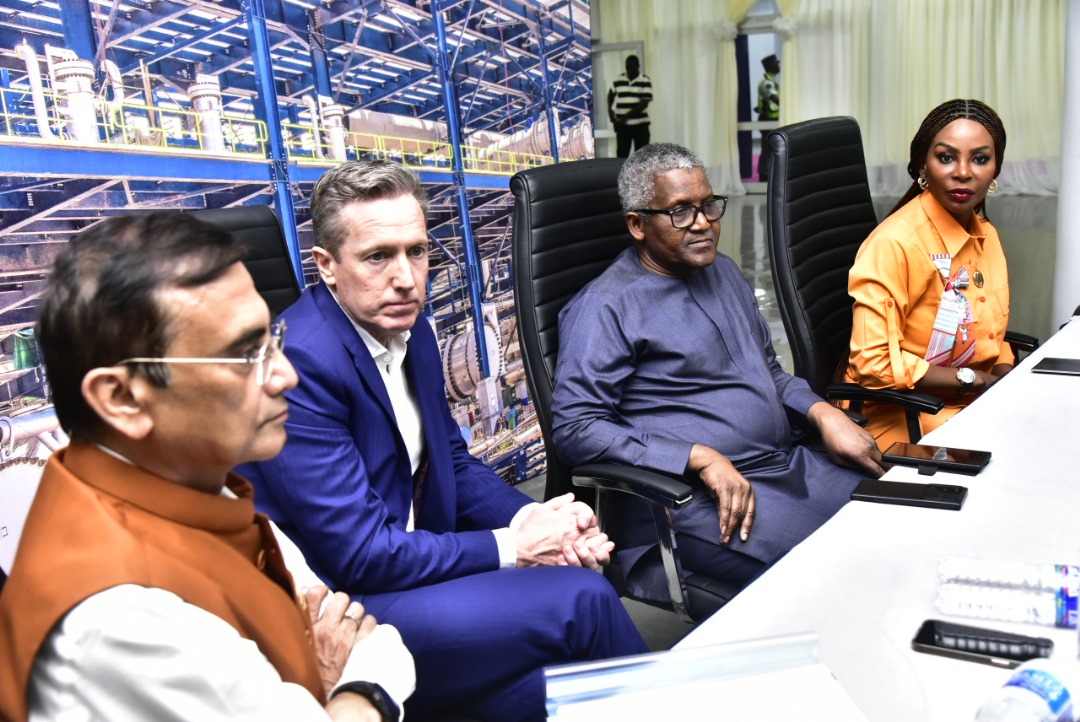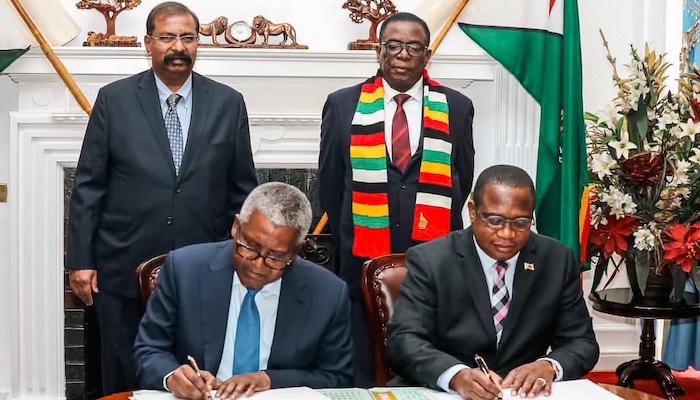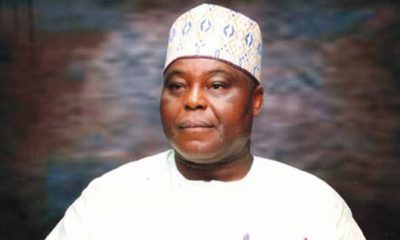Business
TTB/Union bank ownership: A call for transparent investigation

By Azubike Ugwu
In the last three days, we have seen a storm of allegations regarding the ownership of Titan Trust Bank Limited (TTB) and Union Bank of Nigeria Plc (“Union Bank”), and this has captured public attention. These claims, reportedly stemming from a report submitted to the President by a Special Investigator, Mr Jim Obaze, have initiated a critical discussion around transparency. However, the lack of access to the report begs for an open dialogue to clarify the unfolding narrative.
The core accusation revolves around the former Central Bank Governor’s alleged use of intermediaries in acquiring Union Bank and doubts about whether Titan Bank met the reported purchase price. To understand the gravity of these claims, it’s imperative to grasp the financial magnitude of the investors steering these banks.
TGI Group, with assets exceeding ₦3.75 trillion and 2022 revenues surpassing ₦1.74 trillion, emerges as a financial powerhouse. To underscore this, the sale of its subsidiary “Chivita” to Coca-Cola Group companies in 2020 for more than USD 500 million, a figure nearly three times the alleged equity element in the Union Bank acquisition, speaks volumes about the group’s financial robustness. TGI Group’s financial resilience, underscored by concrete figures, paints a picture of stability.
Contrary to these allegations, documents availed necessary parties indicate that payment for Union Bank shares was indeed made, raising questions about the accuracy of claims suggesting non-payment and highlighting the importance of verifying such financial transactions. Titan Trust Bank’s chairman, Mr Tunde Lemo, has strongly refuted the allegations made by the special investigator, providing details and names that can confirm the transparency and integrity of the transaction. Drawing parallels, it’s akin to questioning a transaction’s legitimacy while the receipts stand as concrete evidence.
The news of Mr. Lemo being summoned by the special investigator once again has been making waves in the business community. The investigator has written a letter in reaction to the rebuttal made by Titan Trust Bank. The letter stated that Mr Lemo and TTB’s rebuttal was offensive.
The letter is filled with many allegations, and it has raised questions about the independence and bias of the investigation. Many wonder whether Mr Obaze is singling out Mr Lemo for unknown offences or if the investigation is truly unbiased and objective.
It is important to note that Mr. Lemo is a respected figure in the business community, and many have lauded his efforts. He has always been known for his dedication and hard work. Therefore, the allegations made against him have come as a surprise to many.
The scrutiny extends to Luxis and Magna, the UAE-based holding companies accused of lacking a physical presence in Dubai. Yet, in the global business landscape, such corporate structures are commonplace. TGI’s financial fortitude backing these entities accentuates their credibility, emphasising the need for context in evaluating business practices. TGI, in its statement, categorically affirmed that “the entire transaction was managed by highly reputed global financial institutions including Rothschild and Citibank. And like most major acquisitions, the process took years to complete. A USD 300 million loan was sourced from the African Export-Import Bank (Afrexim), and the rest of the capital was sourced from the proceeds of TGI’s sales of its Chi Ltd business to Coca-Cola, all to finance the acquisition of Union Bank.”
Another layer to the controversy involves a “mysterious shareholder” supposedly providing interest-free long-term loans. Examination of the financial records reveals that these loans were granted within the TGI Group, illustrating a standard business practice. Parallels can be drawn to global corporate scenarios, where loans within a closely-knit business ecosystem are considered normal.
The allegations surrounding Mr. Cornelius Vink, the founder of TGI Group, necessitate a balanced perspective. As a distinguished Dutch national, his cooperation in providing requested documents to the investigator showcases a commitment to transparency. Analogously, it mirrors other reputable figures in international business who willingly subject themselves to scrutiny.
Turning our attention to the alleged recommendation for the government to take over Union Bank, the financial stability of Union Bank and Titan Bank, coupled with the investigator’s apparent lack of statutory powers for such recommendations, raises questions about the credibility of this assertion. It’s akin to questioning the legitimacy of a referee’s call beyond the established rules of the game. Mr Obaze lacks the necessary statutory powers to make such calls and appears once again to be arrogating powers to himself that are not legal. Perhaps we should remember and question his many ‘allegations’ against corporate entities and individuals that were just him bloviating.
Amidst this uncertainty, the call for transparency echoes louder. TGI Group’s financial resilience, fortified by concrete evidence, underscores the importance of a candid dialogue to address the swirling allegations surrounding the Union Bank/Titan Trust Bank transaction. The figures presented and the parallels drawn serve as signposts guiding the need for clarity in this complex financial tapestry.
The business community eagerly awaits the outcome of this investigation and hopes the truth will come out. Until then, these questions must be answered.
1. Why did the Special Investigator go to the media instead of taking the usual investigative or legal route?
2. Is this an attempt to create negative publicity for the Banks, TGI and personalities involved without presenting any evidence?
3. If the Special Investigator believes that Mr Godwin Emefiele owns the bank as he has alleged, why hasn’t he provided any evidence after such a lengthy investigation?
4. Why is he specifically targeting and harassing legitimate business owners and professionals?
5. Is the Special Investigator suggesting that the government is willing to face significant consequences by seizing private investments, especially when the nation is actively trying to attract foreign investments?
It is prudent for Mr Obaze to remember that rather than this media trial that he has embarked on, “affirmanti non neganti incumbit probation” – the burden of proof lies on him, who asserts.
Business
Dangote Refinery to supply 1.5bn litres of petrol monthly

….Writes NMDPRA, Engages Marketers to Stabilise Fuel Market
Photo caption: L R: Chief Executive Officer, Dangote Fertiliser Limited, Vishwajit Sinha; Chief Executive Officer and Managing Director, Dangote Petroleum Refinery, David Bird; President and Chief Executive, Dangote Industries Ltd, Aliko Dangote; Managing Director and Chief Executive Officer, South South Development Commission, Usoro Akpabio, during the visit of SSDC members to the Dangote Petroleum Refinery and Fertiliser Plant in Lagos on Sunday, November 30, 2025.
Dangote Petroleum Refinery has announced plans to supply one billion five hundred million litres of Premium Motor Spirit (PMS) monthly to the Nigerian market in December 2025 and January 2026, a move aimed at ensuring uninterrupted nationwide fuel availability through the festive season and into the New Year.
President and Chief Executive of Dangote Industries Limited, Aliko Dangote, disclosed the plans at the weekend, noting that the refinery will make available 50 million litres of PMS daily beginning December 1.
“In line with our commitment to national wellbeing, and consistent with our track record of ensuring a holiday season free of fuel scarcity, the Dangote Petroleum Refinery will supply 1.5 billion litres of PMS to the Nigerian market this month. This represents 50 million litres per day. We are formally notifying the Nigerian Midstream and Downstream Petroleum Regulatory Authority (NMDPRA) of this commitment. We will supply another 1.5 billion litres in January and increase to 1.7 billion litres in February, which translates to about 60 million litres per day,” Dangote said.
Photo caption: L R: President and Chief Executive, Dangote Industries Ltd, Aliko Dangote; Managing Director and Chief Executive Officer, South South Development Commission, Usoro Akpabio, during the visit of SSDC members to the Dangote Petroleum Refinery and Fertiliser Plant in Lagos on Sunday, November 30, 2025.
Speaking during a visit by the South-South Development Commission (SSDC) to the refinery and the Dangote Fertiliser complex, he stated that the facility currently has adequate stock and is producing between 40 and 45 million litres of PMS daily. He added that the daily supply of 50 million litres should dispel long-standing claims that domestic refineries lack the capacity to meet national demand.
Dangote also revealed ongoing engagement with petroleum marketers to strengthen distribution systems, including expanding the use of CNG-powered haulage.
“Our priority is to ensure Nigeria receives the products it needs. This is not driven by profit motives; it is about guaranteeing the availability of essential energy products. It is similar to the transformation we delivered in the cement sector,” he added.
He further noted that the refinery is progressing with its expansion plan to reach a capacity of 1.4 million barrels per day. More than 100,000 workers are expected to be involved in the expansion of both the refinery and the fertiliser complex. Dangote emphasised that the Group remains committed to its vision, driven by the strong public support for the company’s role in shaping Nigeria’s economic development.
During the visit, the Managing Director of SSDC, Usoro Offiong Akpabio, commended Dangote’s leadership and his continued contribution to strengthening Nigeria’s industrial capability, national energy security and long-term economic competitiveness.
She described the South-South region as Nigeria’s natural energy corridor, with vast crude oil reserves, gas infrastructure, maritime assets, agro-industrial activity and emerging industrial clusters. She noted that deeper collaboration between the region and the Dangote Group could unlock opportunities in product distribution, CNG infrastructure, petrochemicals, agriculture, and employment creation.
Akpabio added that such partnerships would advance the Federal Government’s energy stability agenda and position the South-South as a strategic growth hub for the Dangote Group.
“As the statutory development body for the South-South, SSDC is mandated to drive regional economic development, infrastructure integration, human capital advancement, and private-sector–led growth. In this regard, we stand prepared to support State-level policy and regulatory support for Ease-of-doing-business across our six states. Enabling environments for Dangote Group’s expansion into strategic sectors such as gas processing, agro-industrial value chains, renewable energy, logistics, and export-oriented manufacturing,” she said.
In a letter from the refinery’s Managing Director, David Bird, to the Authority Chief Executive of the NMDPRA, the company reaffirmed its readiness to host NMDPRA officials onsite at the refinery from December 1st to verify and publish its daily supply volumes. The refinery also sought the Authority’s support to ensure unhindered importation of crude, feedstocks and blending components, as well as smooth vessel loading for product evacuation.
“In the spirit of full transparency to the public we are willing to publish our daily production and stock volumes (online and print media),” Bird stated. “We seek the full support of NMDPRA to allow Dangote refinery to import our crude, feedstocks and blending components unhindered as well as support the lifting of our products by vessel. We continue to experience delays in vessel clearance which impacts not only the refinery operations but also our customers, adding unnecessary costs and inefficiencies”.

By Bonaventure Phillips Melah
Photo caption: L R: Chief Executive Officer, Dangote Fertiliser Limited, Vishwajit Sinha; Chief Executive Officer and Managing Director, Dangote Petroleum Refinery, David Bird; President and Chief Executive, Dangote Industries Ltd, Aliko Dangote; Managing Director and Chief Executive Officer, South South Development Commission, Usoro Akpabio, during the visit of SSDC members to the Dangote Petroleum Refinery and Fertiliser Plant in Lagos on Sunday, November 30, 2025.
Dangote Petroleum Refinery has announced plans to supply one billion five hundred million litres of Premium Motor Spirit (PMS) monthly to the Nigerian market in December 2025 and January 2026, a move aimed at ensuring uninterrupted nationwide fuel availability through the festive season and into the New Year.
President and Chief Executive of Dangote Industries Limited, Aliko Dangote, disclosed the plans at the weekend, noting that the refinery will make available 50 million litres of PMS daily beginning December 1.
“In line with our commitment to national wellbeing, and consistent with our track record of ensuring a holiday season free of fuel scarcity, the Dangote Petroleum Refinery will supply 1.5 billion litres of PMS to the Nigerian market this month. This represents 50 million litres per day. We are formally notifying the Nigerian Midstream and Downstream Petroleum Regulatory Authority (NMDPRA) of this commitment. We will supply another 1.5 billion litres in January and increase to 1.7 billion litres in February, which translates to about 60 million litres per day,” Dangote said.

Photo caption: LR: President and Chief Executive, Dangote Industries Ltd, Aliko Dangote; Managing Director and Chief Executive Officer, South South Development Commission, Usoro Akpabio, during the visit of SSDC members to the Dangote Petroleum Refinery and Fertiliser Plant in Lagos on Sunday, November 30, 2025.
Speaking during a visit by the South-South Development Commission (SSDC) to the refinery and the Dangote Fertiliser complex, he stated that the facility currently has adequate stock and is producing between 40 and 45 million litres of PMS daily. He added that the daily supply of 50 million litres should dispel long-standing claims that domestic refineries lack the capacity to meet national demand.
Dangote also revealed ongoing engagement with petroleum marketers to strengthen distribution systems, including expanding the use of CNG-powered haulage.
“Our priority is to ensure Nigeria receives the products it needs. This is not driven by profit motives; it is about guaranteeing the availability of essential energy products. It is similar to the transformation we delivered in the cement sector,” he added.
He further noted that the refinery is progressing with its expansion plan to reach a capacity of 1.4 million barrels per day. More than 100,000 workers are expected to be involved in the expansion of both the refinery and the fertiliser complex. Dangote emphasised that the Group remains committed to its vision, driven by the strong public support for the company’s role in shaping Nigeria’s economic development.
During the visit, the Managing Director of SSDC, Usoro Offiong Akpabio, commended Dangote’s leadership and his continued contribution to strengthening Nigeria’s industrial capability, national energy security and long-term economic competitiveness.
She described the South-South region as Nigeria’s natural energy corridor, with vast crude oil reserves, gas infrastructure, maritime assets, agro-industrial activity and emerging industrial clusters. She noted that deeper collaboration between the region and the Dangote Group could unlock opportunities in product distribution, CNG infrastructure, petrochemicals, agriculture, and employment creation.
Akpabio added that such partnerships would advance the Federal Government’s energy stability agenda and position the South-South as a strategic growth hub for the Dangote Group.
“As the statutory development body for the South-South, SSDC is mandated to drive regional economic development, infrastructure integration, human capital advancement, and private-sector–led growth. In this regard, we stand prepared to support State-level policy and regulatory support for Ease-of-doing-business across our six states. Enabling environments for Dangote Group’s expansion into strategic sectors such as gas processing, agro-industrial value chains, renewable energy, logistics, and export-oriented manufacturing,” she said.
In a letter from the refinery’s Managing Director, David Bird, to the Authority Chief Executive of the NMDPRA, the company reaffirmed its readiness to host NMDPRA officials onsite at the refinery from December 1st to verify and publish its daily supply volumes. The refinery also sought the Authority’s support to ensure unhindered importation of crude, feedstocks and blending components, as well as smooth vessel loading for product evacuation.
“In the spirit of full transparency to the public we are willing to publish our daily production and stock volumes (online and print media),” Bird stated. “We seek the full support of NMDPRA to allow Dangote refinery to import our crude, feedstocks and blending components unhindered as well as support the lifting of our products by vessel. We continue to experience delays in vessel clearance which impacts not only the refinery operations but also our customers, adding unnecessary costs and inefficiencies”.
Business
Dangote expands presence in Africa, signs $1b investment deal for cement, energy in Zimbabwe

Africa’s richest man and the Chief Executive Officer (CEO) of Dangote Group, Alhaji Aliko Dangote, has signed a deal to invest over $1 billion in cement and energy in Zimbabwe.
Dangote spoke to journalists after meeting with Zimbabwean President Emmerson Mnangagwa in Harare on Wednesday.
The billionaire businessman said he signed an agreement on behalf of Dangote Group to build cement and power plants as well as a fuel pipeline.
“… we have just actually signed an agreement between Zimbabwe and Dangote Group to do various investments in various sectors, some of which, of course, border on cement, some of it in power generation, and some of it in pipelines to bring petroleum products,” he said.
Dangote said the investment will be worth over $1 billion “because of the pipeline”, noting that the group is planning a couple of other investments in the country.
Speaking on governance in Zimbabwe, he said Mnangagwa transformed the economy, adding that “there is a lot of transparency”.
“And also, when you look at what His Excellency has actually done in terms of turning the economy around, that really gave us the confidence that this is the right time for us to come and invest,” Dangote said.
“And, you know, it’s like somebody, when you pass the exam, people have to give you a good mark. So His Excellency has passed that exam.”
Dangote previously expressed interest in similar investments in Zimbabwe in 2015, including plans for his Dangote Cement Plc to build a $400 million plant with a processing capacity of 1.5 million tons annually.
With the latest deal signing, Dangote is adding Zimbabwe to his list of investment destinations across the continent, which includes Ethiopia and Zambia.
On October 5, the Dangote Group commenced the construction of a $2.5 billion fertiliser plant in Gode, Ethiopia.
The project, a joint venture between the conglomerate and the Ethiopian Investment Holdings (EIH), is expected to have an annual production capacity of three million metric tonnes of urea, positioning it among the largest fertiliser complexes in the world.
Dangote Cement had also built a 1.5 million tonnes per annum (mta) plant in Zambia. The plant began operations in the second quarter (Q2) of 2015, according to information on the company’s website.
-

 News2 years ago
News2 years agoBreaking: Tinubu’s authentic ministerial nominees
-

 News9 months ago
News9 months agoSenate to speed up conclusion of Nigeria Forest Security Service Bill
-

 News2 years ago
News2 years ago“Anytime we want to kill terrorists, President would ask us to take permission from France but they were killing our soldiers-” Niger Republic coup leader
-

 News2 years ago
News2 years ago“I’m leaving the Catholic church because Bishop Onah is oppressing me,” says Okunerere
-

 News2 years ago
News2 years agoRadio Nigeria’s veteran broadcaster Kelvin Ugwu dies three months after retirement from service
-

 News2 years ago
News2 years agoDokpesi and the Gazebo Mystique
-

 News2 years ago
News2 years agoTsunami: Tinubu orders dissolution of managements, boards of MDAs, to sack all Buhari’s political appointees
-

 News2 years ago
News2 years agoPersons against Allagoa’s reforms behind protests at NSITF
